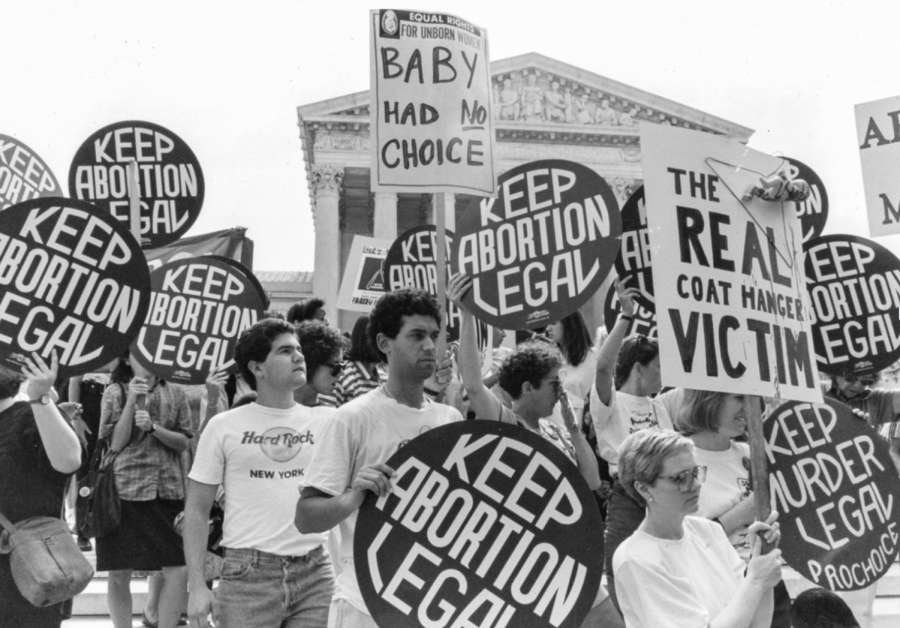Even “Pro-Lifers” Should be Scared of the Texas Abortion Law
Texas abortion ban restricts more than just women’s bodies.
October 4, 2021
On June 7th, 2019, Texas Governor Greg Abbott signed a detrimental abortion bill into law. Senate Bill 8 came into effect on September 1st, 2021, declaring all abortions illegal (including in cases of rape or incest) once an ultrasound can detect a fetal “heartbeat” as defined by legislators, not doctors. The bill effectively bans all abortions as early as six weeks into pregnancy.
According to UCSF obstetrician-gynecologist Dr. Jody Steinauer, because pregnancy is measured by the number of weeks after your last period, four weeks gestation marks the day a person’s period is due. She claims that within the timeline of this Texas abortion law “You have to discover your period is late, take a pregnancy test, and then get to a clinic in two weeks.” The low likelihood of accessing abortion care by six weeks is confirmed by studies showing that SB 8 banned about 85% of abortions regularly performed in Texas.
Texas is already turning people away from this critical healthcare, and while high-income people can cross state borders to access safe, legal abortions, low-income people are facing barriers to these transportation methods. As Dr. Steinauer states, “People will now have to travel long distances to get care, which will cause huge inequities in which poor women won’t be able to get the care they need.”
Ultimately, anti-abortion individuals must face the fact that people will obtain abortions whether they are legal or not, the question is if they are safe or unsafe. Prior to the Supreme Court Roe v Wade decision declaring a woman’s right to abortions free of government restriction, people often accessed unsafe abortion care when facing barriers to reproductive healthcare, resulting in multiple deaths and extreme injuries. More recently, in 2018 prior to Argentina’s legalization of abortion, thirty-five women’s deaths were reported as a result of illegal abortions.
People who deem themselves “pro-life” must question their own values when confronted with these statistics. Banning or restricting abortions leads to the deaths of people seeking these abortions. For those who cannot afford to leave Texas for their abortion, many will seek care outside of medicine. For some, this will mean that they access safe medical abortion methods on their own through the internet or by crossing the border into Mexico, but others will resort to unsafe methods like self-abortion or “backroad” abortions.
The Bill also has harmful legal implications. Dr. Steinauer explains, “The other thing is that the Texas law allows any citizen to sue someone who they suspect has helped someone access abortion care at a gestation after about six weeks.” This includes if someone helps someone get transported to a clinic, assists in paying for the procedure or gives them health advice related to abortion care. Others who may be sued include doctors, clinic staff members, or even uber drivers. Not only has this sparked fear in the friends and family of people seeking abortion care, but also doctors. As Dr. Steinauer describes, “Now health care providers are afraid to give women information and refer them to care if there is a chance they are passed about six weeks. Some are even afraid to give them information about how to access legal care outside of the state.”
SB 8 sets a dangerous precedent for laws created elsewhere. The Biden Administration has vowed to act against the law and the Department of Justice sued Texas on September 9th in an attempt to prevent its enforcement. Hearings in the U.S. District Court for the Western District of Texas begin this Friday, with U.S. District Judge Robert Pitman overseeing the hearing. If this new law is upheld, many people worry that other states will enact similar laws regarding abortion or other issues. This should worry all individuals regardless of their beliefs about abortion because this law has implications beyond abortion care. For example, what if you could sue your neighbor for helping someone buy a gun, or for using contraception outside of marriage?
Whether you are democratic or republican, atheist or religious, pro-choice or pro-life, the Texas Abortion Law should strike you as frightening. Separate from the moral questions of blocking people’s access to essential reproductive healthcare, SB 8 will cause people to take risks in accessing abortion care, disproportionately affect low-income individuals, and set a dangerous precedent for legislation everywhere. I urge you to speak out in your respective communities on behalf of the importance of abortion access and sign petitions on the ACLU and Planned Parenthood to begin fighting against SB 8.


